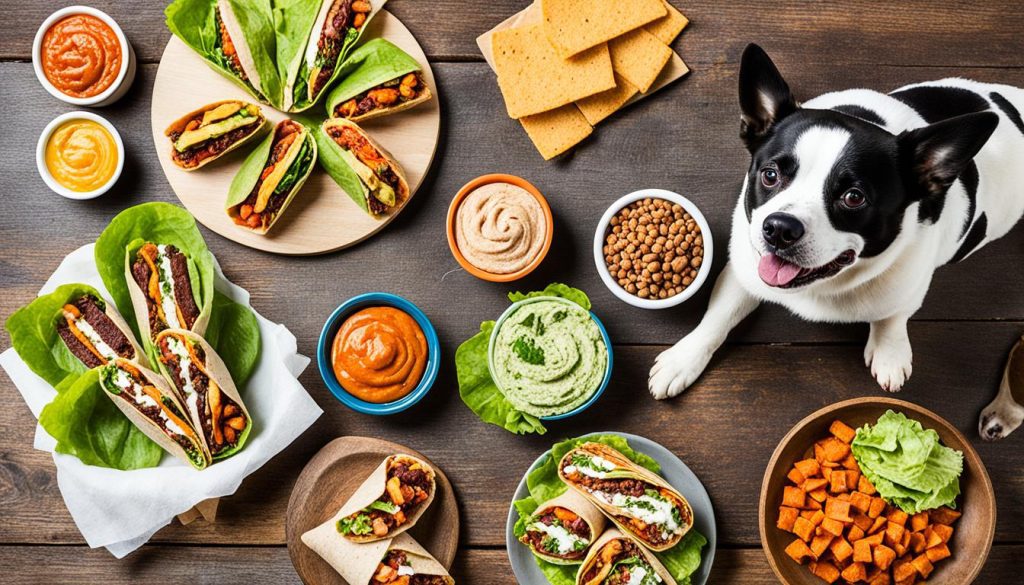Hello, pet lovers! Today, I’ll be addressing a popular query among dog owners: can dogs eat corn tortillas? We all want to ensure our furry friends’ well-being, and that includes making informed decisions about their diet. In this article, I’ll provide you with all the essential information you need to know about feeding corn tortillas to dogs. Let’s dive right in!
When it comes to dog diets, it’s important to consider the nutritional needs of our canine companions. While corn tortillas can be consumed by dogs in moderation, it’s crucial to understand the potential risks and benefits associated with this particular food item.
Feeding corn tortillas to dogs can provide them with beneficial nutrients such as fiber and magnesium. However, it’s vital to limit the amount of corn tortillas given to dogs and avoid toppings or fillings that may be harmful. Remember, corn tortillas should never replace a balanced and nutritious diet for your furry friend.
Can Dogs Eat Corn Tortillas? Yes, they can, in small amounts.
- Corn tortillas can be consumed by dogs in moderation, providing them with fiber and magnesium.
- It’s important to limit the amount of corn tortillas given to dogs and avoid harmful toppings or fillings.
- Feeding corn tortillas should be done in addition to a balanced diet tailored to dogs’ specific needs.
- When in doubt, consult with a veterinarian for personalized dietary advice for your furry friend.
Are Tortillas Good for Dogs?
When it comes to selecting food options for our furry friends, it’s important to consider their well-being and nutritional needs. But what about tortillas? Can dogs enjoy this popular human food? Let’s explore the benefits and nutrients that tortillas can provide for our canine companions.
First, let’s talk about corn tortillas. These tortillas can be a good source of fiber and magnesium for dogs. Fiber is essential for maintaining a healthy digestive system, while magnesium plays a vital role in numerous bodily functions. Additionally, corn tortillas are often made with simple ingredients and have low sodium content, making them a potentially healthier choice for dogs.
On the other hand, there are other types of tortillas to consider. Wheat tortillas, for example, can provide calcium and potassium, which are important minerals for overall canine health. Flour tortillas may even contain various essential vitamins and minerals that can contribute to a well-rounded diet for dogs.
However, it’s crucial to note that every dog is unique, with different dietary needs and health conditions. Before introducing tortillas into their diet, consult with a veterinarian to ensure it aligns with their specific requirements.
Remember, it’s essential to consider tortillas as an occasional treat rather than a staple food in a dog’s diet. Moderation is key, as excessive consumption can lead to weight gain and potential health issues. Always prioritize a balanced and nutritious diet for your furry friend.
If you’re considering offering your dog tortillas, be mindful of their individual dietary needs and health conditions. While tortillas can provide certain benefits and nutrients, it’s always best to consult with a veterinarian before making any changes to your dog’s diet. As responsible pet owners, we should prioritize our furry companions’ overall well-being and provide them with the best possible care.
How Much Tortilla Can Dogs Eat?
When it comes to feeding tortillas to dogs, moderation is key. While dogs can enjoy tortillas as an occasional treat, it is important to limit their consumption. Dogs should only be given a small amount of tortilla, with no more than 1-2 small pieces per week.
Feeding excessive amounts of tortillas to dogs can have negative consequences on their health. Dogs that consume too many tortillas can experience weight gain, which can lead to issues such as constipation, obesity, and even heart disease. Therefore, it is important to exercise caution and control the serving size of tortillas for dogs.
By limiting the amount of tortilla you give to your furry friend, you can help maintain their overall health and well-being. Remember, tortillas should only be a small part of their diet and not a substitute for a balanced meal tailored to their specific nutritional needs.

When offering tortillas to your dog, always remember to cut them into bite-sized pieces to prevent any potential choking hazards. Additionally, it’s important to keep in mind that tortillas should be given in plain form, without any fillings or toppings that may be harmful to dogs.
By following these guidelines and considering the moderation of tortilla consumption, you can safely incorporate tortillas as a special treat for your canine companion.
Corn Tortilla vs Wheat Tortilla: Which is Better for Dogs?
When it comes to choosing between corn tortillas and wheat tortillas for dogs, it’s important to consider the specific dietary needs and sensitivities of your furry friend. Both types of tortillas have their own benefits and drawbacks, so let’s explore them:
Corn Tortillas:
Corn tortillas are gluten-free and easier to digest than wheat tortillas, making them a suitable option for dogs with allergies or sensitive stomachs. They contain proteins, carbohydrates, linoleic acid, and antioxidants that can contribute to a balanced diet. The fiber content in corn tortillas can promote healthy digestion in dogs, while the antioxidants help support their overall well-being. Including corn tortillas in moderation can be beneficial for dogs, but it’s important to avoid any toppings or fillings that may be harmful.
Wheat Tortillas:
On the other hand, wheat tortillas can be a good source of calcium and potassium, which are essential minerals for dogs. These tortillas contain gluten and may not be suitable for dogs with gluten sensitivity or certain medical conditions. Wheat tortillas also provide some essential vitamins and minerals that can contribute to dogs’ overall nutrition. However, it’s important to note that excessive consumption of wheat tortillas can lead to weight gain, so portion control is essential.
Ultimately, the choice between corn tortillas and wheat tortillas depends on your dog’s specific needs and sensitivities. If your dog has allergies or sensitivities to gluten, corn tortillas may be a better option. However, if your dog can tolerate gluten and could benefit from the calcium and potassium in wheat tortillas, they can be included in their diet in moderation. It’s always best to consult with your veterinarian to determine the most suitable tortilla option for your furry friend.
Remember, tortillas should only be given to dogs as a treat and should not replace a balanced and nutritious diet.
How to Safely Feed Tortillas to Dogs
When it comes to feeding tortillas to dogs, safety should be the top priority. Here are some important tips to ensure your furry friend can enjoy tortillas without any harm:
- Choose plain tortillas: Opt for plain tortillas without any added ingredients or seasonings. Flavored tortillas and those with toppings or fillings can be harmful to dogs. Stick to the simple and natural version for their safety.
- Cut into bite-sized pieces: To prevent choking hazards, it is essential to cut tortillas into small, bite-sized pieces that are easier for dogs to chew and swallow. This will ensure they can safely enjoy their treat without any risk.
- Avoid processed tortillas: Processed tortillas often contain additives and preservatives that can be harmful to dogs. It is best to avoid these and opt for homemade tortillas or carefully check the ingredient list before purchasing tortilla-based products.
- Check ingredients: Always double-check the ingredients of any tortilla-based dish you plan to share with your dog. Make sure the ingredients are safe for canine consumption and do not include any toxic substances.
- Consider homemade tortillas: Making homemade tortillas can be a safer option as it allows you to have better control over the ingredients. You can ensure they are made with dog-friendly ingredients and free from harmful additives.
By following these guidelines, you can safely feed tortillas to your furry companion, providing a tasty treat without compromising their health and well-being.
Potential Risks of Feeding Corn Tortillas to Dogs
Feeding corn tortillas to dogs can pose several potential risks and negative effects on their health. It is important for pet owners to be aware of these risks in order to make informed decisions about their dog’s diet.
Firstly, excessive consumption of corn tortillas can cause digestive issues in dogs. Dogs may experience diarrhea or constipation as a result of consuming too much corn tortilla. This can lead to discomfort and potential dehydration for the dog.
Another risk is that some dogs may be allergic to corn. Allergic reactions can manifest in various ways, such as skin irritations, itching, or gastrointestinal distress. If your dog shows any signs of allergic reactions after consuming corn tortillas, it is crucial to consult with a veterinarian.
Furthermore, corn tortillas are high in carbohydrates, which can contribute to weight gain in dogs. Overfeeding corn tortillas can result in obesity, which can lead to various health problems such as joint issues, heart disease, and reduced overall quality of life for your furry friend.
Additionally, the toppings or fillings on tortillas can also pose risks to dogs. Some toppings may contain harmful ingredients such as excessive salt, seasonings, or even toxic ingredients like onions and garlic. These ingredients can be detrimental to a dog’s health and should be avoided.
Considering these potential risks, it is important for dog owners to be cautious when feeding corn tortillas to their pets. Moderation is key, and corn tortilla consumption should be limited to avoid any negative effects on the dog’s health. It is always best to consult with a veterinarian for personalized dietary advice and to explore healthier alternatives that better suit your dog’s specific needs.
Alternatives to Corn Tortillas for Dogs’ Diet
If you’re looking for alternatives to corn tortillas for your furry friend, there are several healthy options that can be included in their diet. These alternatives can provide a variety of nutrients while ensuring your dog’s safety and well-being.
Brown Rice Tortillas
Brown rice tortillas can be a great gluten-free option for dogs. They are made from whole grain brown rice, which provides fiber and magnesium. These tortillas can be a healthier alternative to corn tortillas and can be easily incorporated into your dog’s meals as a treat or snack.
Whole Wheat Tortillas
Whole wheat tortillas can be another safe option for dogs. They contain calcium and potassium, which are essential for their overall health. Just like corn tortillas, it’s crucial to serve whole wheat tortillas in moderation and consider your dog’s specific dietary needs.
Homemade Tortillas
If you want complete control over the ingredients, making homemade tortillas for your dog is a great choice. By using simple and dog-friendly ingredients, you can customize the tortillas to suit your dog’s preferences and dietary requirements.

Lettuce Wraps
For a low-carb alternative, you can replace tortillas with lettuce wraps. Lettuce is a healthy and dog-friendly option that can provide a satisfying crunch while reducing the carbohydrate content of your dog’s meal. Just make sure to choose lettuce varieties that are safe for dogs, such as romaine or green leaf lettuce.
When choosing alternatives to corn tortillas for your dog, it’s important to consider their specific dietary needs and any health conditions they may have. Consulting with a veterinarian can provide you with personalized advice on the best options for your furry friend’s diet.
Conclusion
While corn tortillas can be enjoyed by dogs as a treat, it is important to prioritize their health and safety. Feeding tortillas to dogs should be done in moderation and with caution, taking into consideration their specific dietary needs and any existing health conditions. While tortillas can provide some beneficial nutrients, it is crucial to avoid flavored or seasoned varieties that can be harmful to dogs.
It is always best to consult with a veterinarian for personalized advice on feeding tortillas to dogs. They can provide guidance based on the individual needs of your furry friend and recommend healthier alternatives that align with their dietary requirements. Remember, a balanced and varied diet is essential for your dog’s overall well-being.
When it comes to pet safety, it’s important to exercise caution and make informed decisions about the food we share with our canine companions. While tortillas can be a tasty and occasional treat, it’s always best to prioritize their health and opt for healthier alternatives whenever possible.






